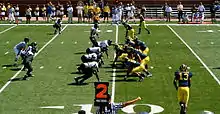Offside (American football)
Offside is a minor foul in gridiron football caused when a defender crosses the line of scrimmage ahead of the snap of the ball. The penalty associated with the infraction is the advancing of the ball five yards and a replay of the down.

History
Definition
In gridiron football, offside is a foul in which a player is on the wrong side of the line of scrimmage when the ball is snapped. This foul occurs simultaneously with the snap. Unlike offensive players, defensive players are not compelled to come to a set position before the snap. If a defender jumps across the line but gets back to his side before the snap, there is no foul. In the case of an offside foul, play is not stopped, and the foul is announced at the conclusion of the play. Media covering the games calls it a "free play" for the offense, as the non-offending team may decline the penalty and take the yardage gained on the play (and when the play works against them, like a turnover to the opposing team, the non-offending team can accept the penalty and retake possession of the ball)—unlike in the case of a false start foul against the offense, whereupon the play is immediately stopped by the officials. This allows the offensive team to attempt a riskier play than they would otherwise, as the risk of an interception turnover is nonexistent.
This foul is almost always committed by the defense (any offensive player that moves into the neutral zone after setting would be charged with a false start). However, it is possible for the offense to commit this foul. If an offensive player lines up in the neutral zone, an offside foul will be called against the offense. If a defensive player jumps the snap too early and causes the offensive player to jump early, the defense will be flagged; if a defensive player jumps too early and touches the offensive player, encroachment will be called.
Penalty
Prior to 1925, a call of offside against a defensive unit brought with it an automatic first down in addition to a five-yard advancement of the ball for the offense.[1] However, a December 1924 meeting of the Football Coaches' Association of America spurred a change of rules for the 1925 season eliminating the provision for an automatic first down, while leaving the five yard penalty intact.[1]
The penalty for violation remains 5 yards at most levels of professional and amateur play.
See also
Footnotes
- Associated Press, "Forward Pass to Remain Just Same," Corvallis [OR] Gazette-Times, vol. 16, no. 206 (Dec. 30, 1924), pg. 1.